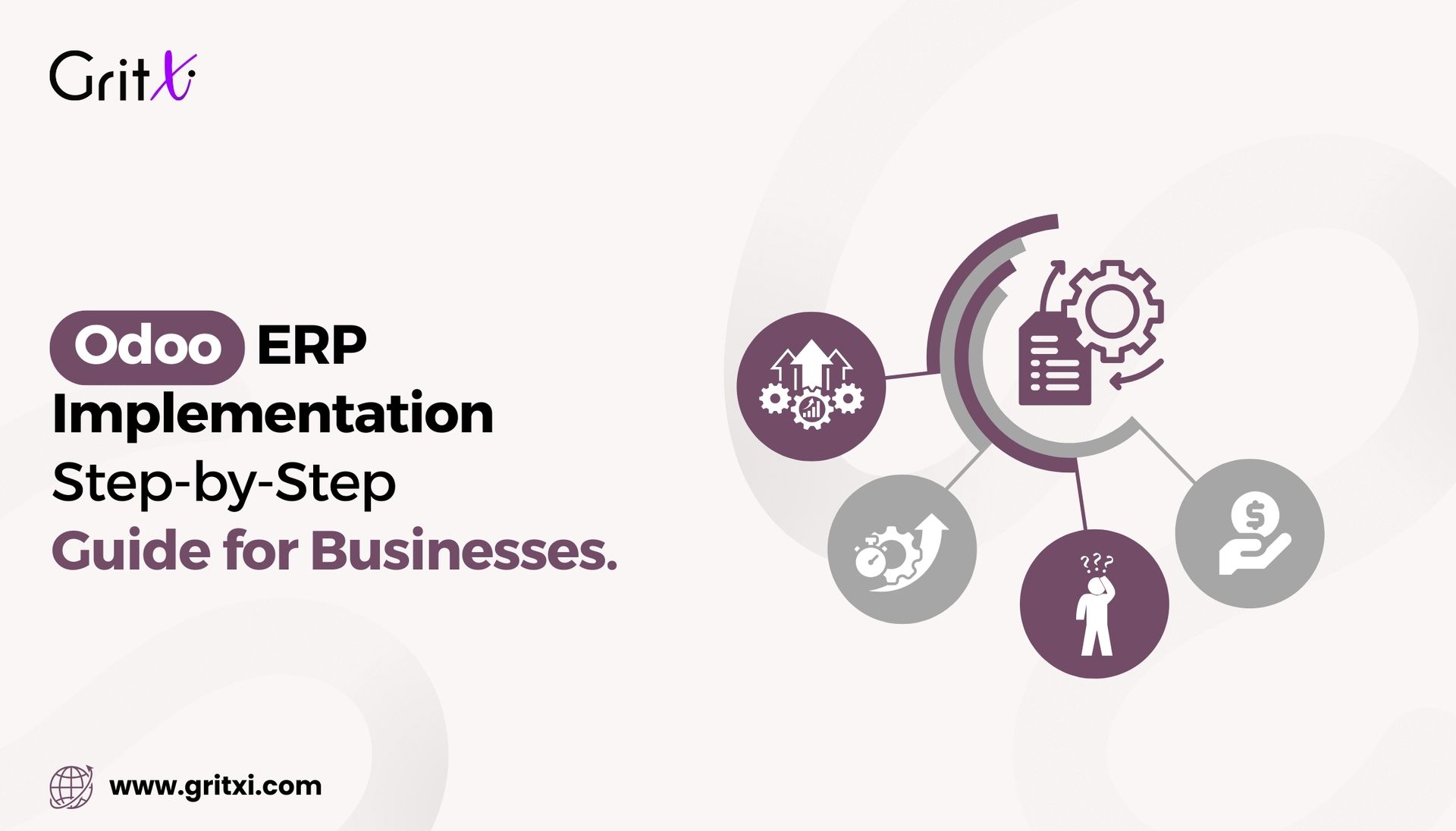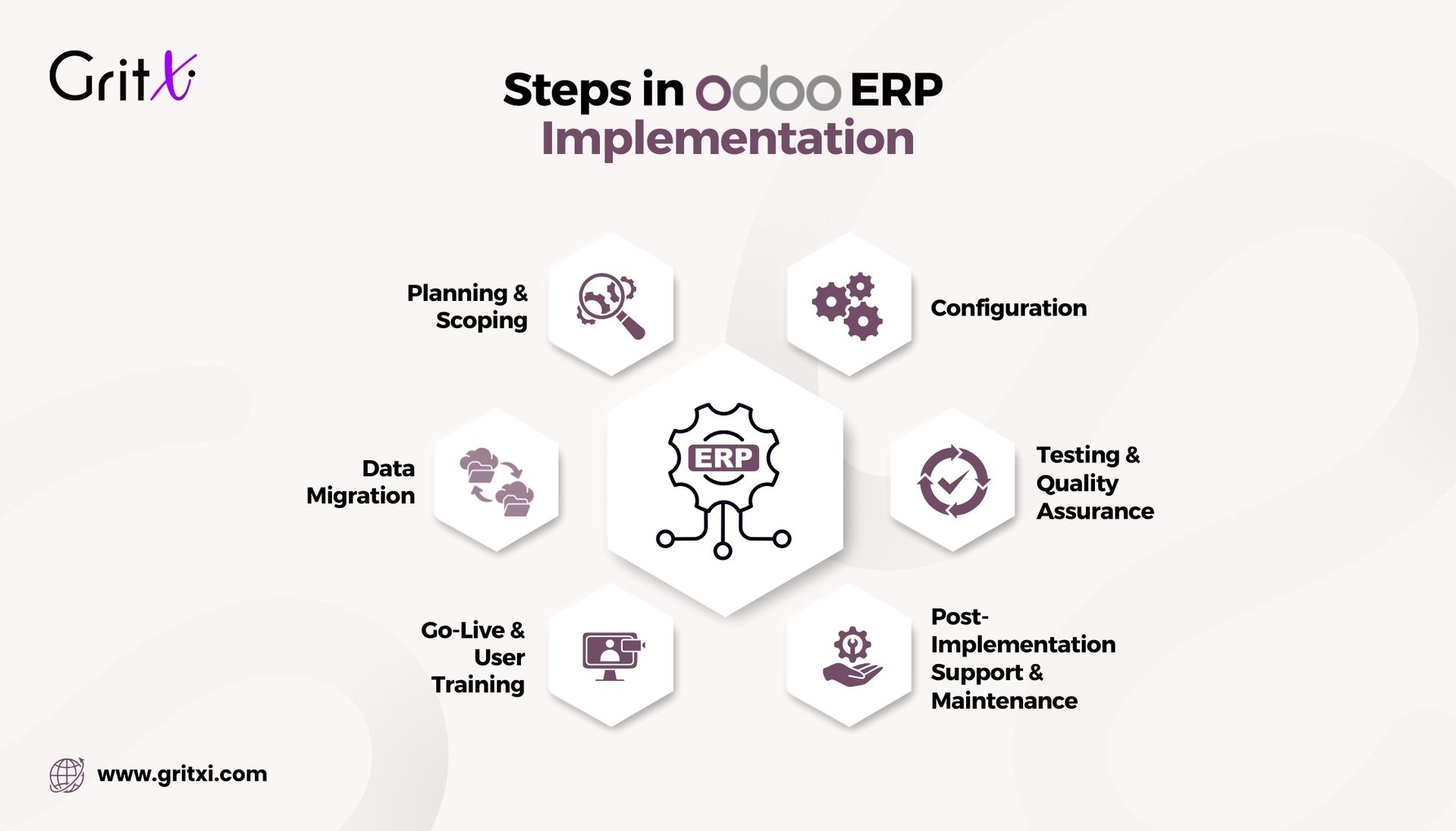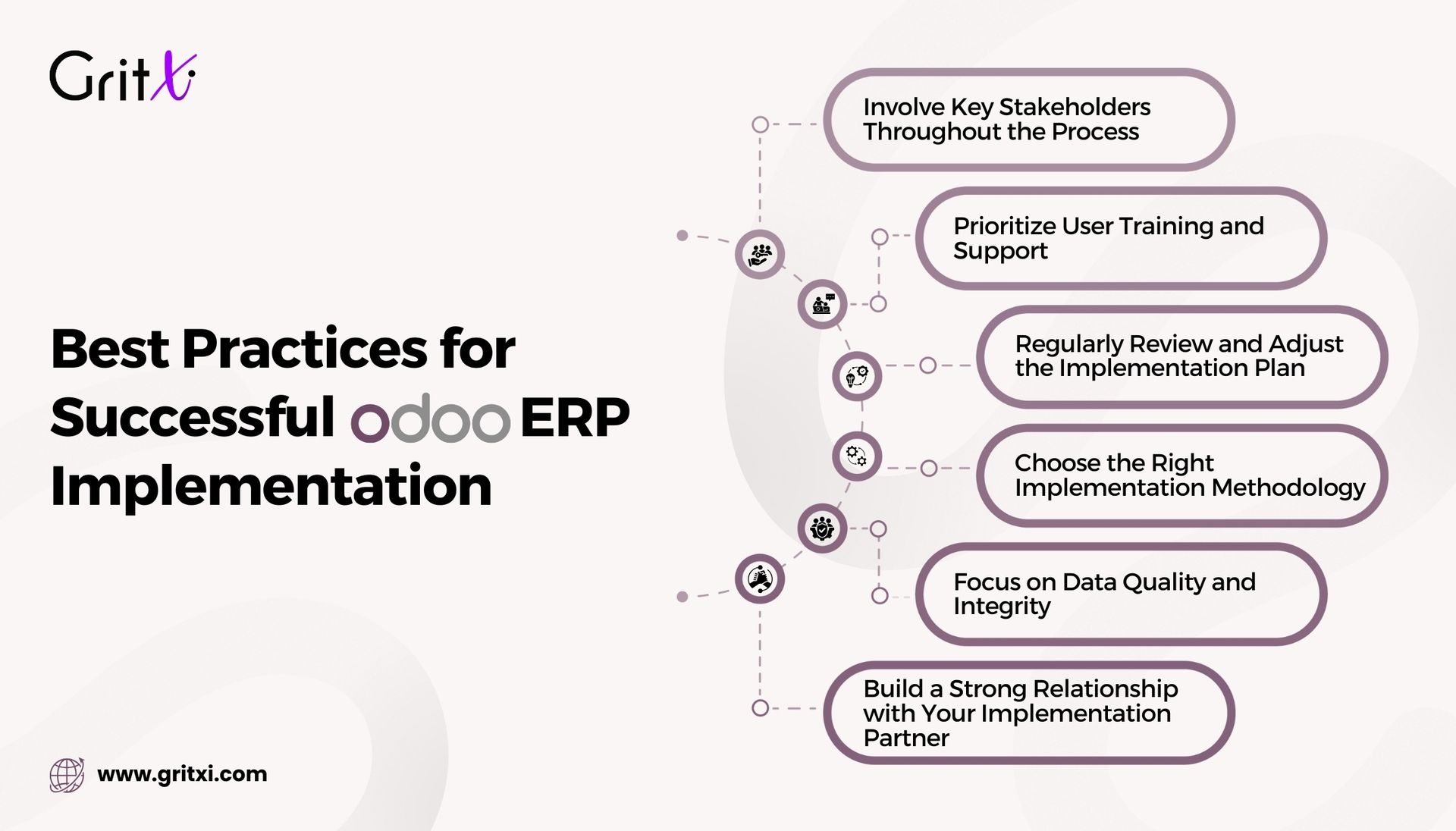
Achieving business success requires more than just ambition—it demands the right systems to streamline operations and fuel growth. Enterprise Resource Planning (ERP) systems have become a cornerstone for businesses, offering seamless integration and efficiency. Odoo ERP has gained significant traction due to its open-source nature, flexibility, and wide range of integrated applications.
Implementing Odoo ERP can bring numerous advantages to your organization, including:
- Increased Efficiency: Automate repetitive tasks, streamline workflows, and minimize manual data entry, leading to significant time and resource savings.
- Improved Data Accuracy: Centralize all business data in a single, unified platform, ensuring data consistency and reducing errors.
- Better Decision-Making: Gain real-time insights into key business metrics, enabling data-driven decisions and improved forecasting.
- Cost Savings: Reduce operational costs by optimizing inventory management, streamlining procurement processes, and automating financial tasks.
What is Odoo ERP Implementation?
Odoo ERP implementation involves the process of integrating and configuring the Odoo software within a specific organization. This goes beyond simply installing the software; it encompasses a comprehensive approach that aligns Odoo with the unique business processes and requirements of the company.
Key stages in a typical Odoo ERP implementation journey include:
- Planning & Scoping: This crucial phase involves a thorough assessment of current business processes, identifying areas for improvement, and defining clear project goals.
- Configuration: This stage focuses on customizing the Odoo system to match the specific needs of the organization. This may involve activating and configuring various modules, adjusting workflows, and creating custom fields and reports.
- Data Migration: This involves carefully transferring existing data from legacy systems to the Odoo database, ensuring data accuracy and integrity.
- Testing & Quality Assurance: Rigorous testing is conducted at various stages to identify and resolve any issues before the system goes live. This may include unit testing, integration testing, and user acceptance testing.
- Go-Live & User Training: The system is launched, and comprehensive training is provided to all end-users to ensure smooth adoption and maximize system utilization.
- Post-Implementation Support & Maintenance: Ongoing support and maintenance are essential to ensure the system continues to function optimally. This includes regular updates, bug fixes, and providing assistance to users as needed.
Benefits of Odoo ERP Implementation
Implementing Odoo ERP can bring significant advantages to businesses across various industries. Some of the key benefits include:
1) Increased Efficiency & Productivity:
- Odoo ERP automates many repetitive tasks, such as data entry, invoice generation, and order processing, freeing up employees to focus on more strategic activities.
- Streamlined workflows and improved process visibility lead to increased productivity and reduced operational bottlenecks.
2) Improved Data Accuracy & Visibility:
- With all business data centralized in a single system, data accuracy and consistency are significantly improved.
- Real-time access to accurate data provides greater visibility into key business metrics, such as sales performance, inventory levels, and financial health.
3) Enhanced Collaboration & Communication:
- Odoo ERP fosters better communication and collaboration among different departments within an organization.
- Features like real-time messaging, shared calendars, and project management tools facilitate seamless communication and teamwork.
4) Better Decision-Making:
- Access to accurate and up-to-date data empowers businesses to make informed decisions.
- Data-driven insights enable organizations to identify areas for improvement, optimize operations, and gain a competitive edge.
5) Cost Savings:
- By automating tasks and streamlining processes, Odoo ERP can significantly reduce operational costs.
- Reduced manual effort, minimized errors, and optimized inventory management all contribute to significant cost savings.
6) Scalability & Flexibility:
- Odoo ERP is a highly scalable solution that can grow with your business.
- It offers flexibility and customization options to adapt to changing business needs and accommodate future growth.
7) Improved Customer Satisfaction:
- By streamlining order processing, improving customer service, and providing a better overall customer experience, Odoo ERP can enhance customer satisfaction and loyalty.
- Features like customer relationship management (CRM) tools help businesses build stronger relationships with their customers.

Steps in Odoo ERP Implementation
A successful Odoo ERP implementation requires a structured and well-defined approach. Here's a breakdown of the key steps involved:
1) Planning & Scoping:
- This critical phase lays the foundation for a successful implementation.
- It involves a thorough needs analysis to understand the organization's specific requirements and identify areas for improvement.
- Clear project goals and objectives are defined, ensuring that the implementation aligns with the overall business strategy.
- A dedicated project team is formed, including key stakeholders from different departments.
- A realistic budget is allocated to cover all aspects of the implementation, including software licenses, consulting fees, training, and ongoing support.
2) Configuration:
- This stage involves customizing the Odoo system to meet the unique needs of the organization.
- This may include activating and configuring various modules, adjusting workflows, creating custom fields, and designing reports.
- The goal is to tailor Odoo to seamlessly integrate with existing business processes and enhance operational efficiency.
3) Data Migration:
This crucial step involves transferring existing data from legacy systems (such as spreadsheets, databases, and other software) to the Odoo database.
- Careful planning and execution are essential to ensure data accuracy and integrity throughout the migration process.
4) Testing & Quality Assurance:
Rigorous testing is crucial to identify and resolve any issues before the system goes live.
- This may include unit testing, integration testing, and user acceptance testing (UAT) to ensure that all functionalities work as expected.
5) Go-Live & User Training:
The go-live phase marks the official launch of the Odoo ERP system.
- Comprehensive user training is provided to all employees to ensure they can effectively use the system and maximize its benefits.
- This may include classroom training, online tutorials, and hands-on workshops.
6) Post-Implementation Support & Maintenance:
Ongoing support and maintenance are crucial for the long-term success of the Odoo ERP implementation.
- This includes providing assistance to users, addressing any issues that may arise, and ensuring the system is kept up-to-date with the latest versions and security patches.
- Regular system reviews and performance analysis help identify areas for improvement and optimize the system over time.
Challenges of Odoo ERP Implementation
While Odoo ERP offers numerous benefits, it's crucial to acknowledge the potential challenges that may arise during the implementation process. By proactively addressing these challenges, businesses can mitigate risks and ensure a smoother transition.
1) Change Management:
Resistance to change is a common human behavior and can significantly impact the success of any new system implementation.
- Employees may be hesitant to adopt new processes and technologies.
- Overcoming this challenge requires effective communication, thorough training, and demonstrating the clear benefits of the new system to all users.
- Engaging employees early on and addressing their concerns can help foster a more positive and accepting environment.
2) Data Migration Issues:
Data quality problems and compatibility issues can arise during the data migration process.
- Inaccurate or incomplete data can lead to errors and inconsistencies within the Odoo system.
- To overcome these challenges, thorough data cleansing and validation procedures should be implemented before and during the migration process.
- Working closely with experienced implementation partners can help ensure a smooth and accurate data migration.
3) Integration Challenges:
Integrating Odoo ERP with existing systems, such as e-commerce platforms, point-of-sale systems, and other software applications, can present challenges.
- Ensuring seamless data flow and interoperability between different systems is crucial for optimal performance.
- Careful planning and consideration of integration requirements during the initial stages of the project can help minimize integration challenges.
4) Budget & Time Overruns:
Cost and time overruns are potential risks in any complex IT project, including Odoo ERP implementation.
- Unforeseen challenges, inadequate planning, and scope creep can contribute to budget and time overruns.
- To mitigate these risks, detailed project plans, regular progress reviews, and proactive risk management strategies are essential.
5) Finding the Right Implementation Partner:
Choosing the right Odoo ERP implementation partner is crucial for the success of the project.
- Selecting a partner with the necessary expertise, experience, and industry-specific knowledge can significantly impact the outcome of the implementation.
- Thorough research, client references, and detailed proposals should be carefully evaluated when selecting an implementation partner.

Best Practices for Successful Odoo ERP Implementation
Following best practices can significantly increase the chances of a successful Odoo ERP implementation. Here are some valuable tips and recommendations:
A) Involve Key Stakeholders Throughout the Process:
- Active involvement from key stakeholders across all departments is crucial.
- This ensures that the implementation aligns with the overall business objectives and addresses the specific needs of each department.
- Regular communication and feedback from stakeholders are essential to ensure project success.
B) Prioritize User Training and Support:
- Comprehensive user training is vital for successful adoption and utilization of the Odoo system.
- Providing adequate training ensures that employees can effectively use the system, understand its functionalities, and maximize its benefits.
- Ongoing support and assistance are also crucial to address any user queries and resolve any issues that may arise.
C) Regularly Review and Adjust the Implementation Plan:
- The implementation plan should be regularly reviewed and adjusted based on project progress, unforeseen challenges, and changing business requirements.
- Flexibility and adaptability are key to ensuring the success of the implementation.
D) Choose the Right Implementation Methodology:
- Selecting the appropriate implementation methodology, such as Agile or Waterfall, can significantly impact the project's success.
- The chosen methodology should align with the project's specific requirements, team dynamics, and risk tolerance.
E) Focus on Data Quality and Integrity:
- Maintaining high data quality and integrity is critical for the success of any ERP system.
- Ensuring accurate and reliable data ensures that the system provides accurate insights and supports sound decision-making.
F) Build a Strong Relationship with Your Implementation Partner:
- A strong and collaborative relationship with your Odoo ERP implementation partner is essential.
- Open communication, regular progress reviews, and proactive issue resolution are key to a successful partnership.
Choosing the Right Odoo ERP Implementation Partner
Selecting the right Odoo ERP implementation partner is crucial for the success of your project. Partnering with a qualified and experienced team can significantly impact the project's timeline, budget, and overall outcome. Here are some key factors to consider when choosing an implementation partner:
1) Experience and Expertise in Odoo Implementation:
- Look for partners with a proven track record of successful Odoo ERP implementations.
- Inquire about their experience in implementing Odoo across various industries and with organizations of different sizes.
2) Industry-Specific Knowledge:
- Ideally, your implementation partner should have experience working with businesses in your specific industry.
- Industry-specific knowledge can help them understand your unique business challenges and tailor the implementation accordingly.
3) Project Management Capabilities:
- Evaluate the partner's project management methodologies and their ability to effectively plan, execute, and monitor the implementation process.
- Look for partners who can provide regular progress reports, manage risks effectively, and ensure the project stays on track.
4) Client Testimonials and References:
- Request client testimonials and references to gain insights into the partner's past performance and client satisfaction.
- Contact previous clients to inquire about their experience working with the partner.
5) Competitive Pricing and Service Offerings:
- Compare pricing and service offerings from different partners.
- Ensure that the chosen partner offers a comprehensive range of services, including implementation, training, support, and maintenance.
- Avoid solely focusing on the lowest price; prioritize value and the overall quality of services.
Key Takeaways for a Smooth Odoo ERP Implementation
Successful Odoo ERP implementation can significantly enhance your organization's efficiency, improve data accuracy, and drive overall business growth. By carefully planning and executing the implementation process, addressing potential challenges, and following best practices, businesses can unlock the full potential of Odoo ERP.
Remember, a well-planned and executed implementation is crucial for achieving the desired outcomes. By investing time and effort in thorough planning, selecting the right implementation partner, and prioritizing user training and support, businesses can ensure a smooth and successful transition to Odoo ERP.
Ready to embark on your Odoo ERP implementation journey? GritXi can help!
We are a team of experienced consultants specializing in Odoo ERP implementation and can guide you through every step of the process.
Schedule a free consultation today to discuss your specific business needs and explore how Odoo ERP can help you achieve your goals.
Odoo ERP Implementation: Step-by-Step Guide for Businesses